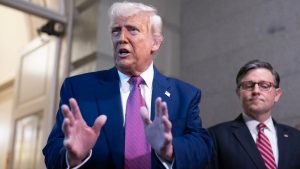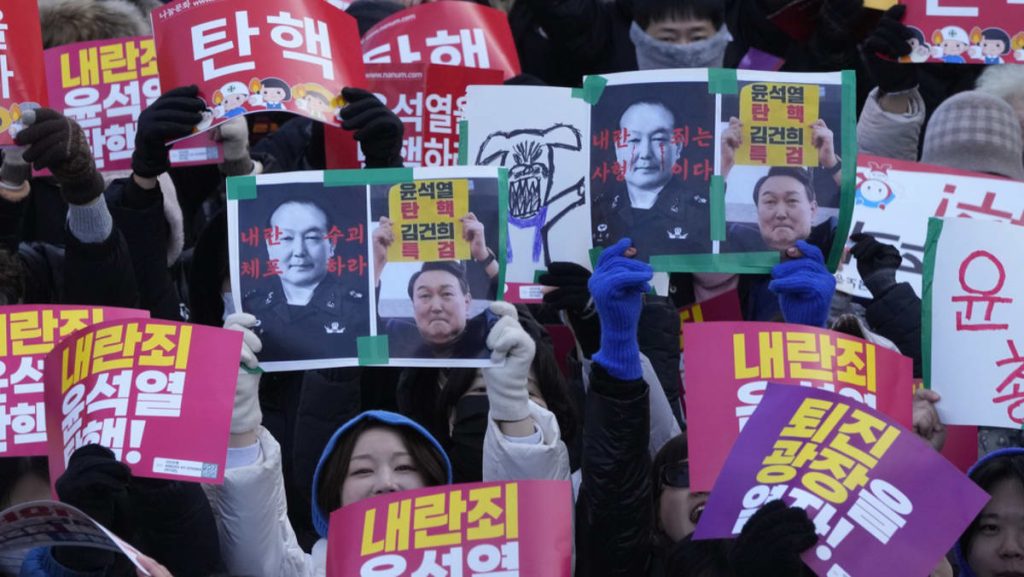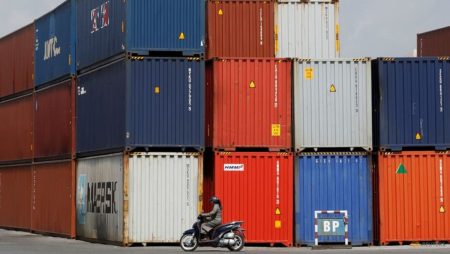President Yoon Suk-yeol of South Korea finds himself in a precarious political predicament, facing a looming impeachment threat that casts a long shadow over his presidency. His future hangs in the balance, with several possible endgame scenarios unfolding, each contingent on the actions of his legislative allies and the broader political landscape. The central question revolves around how the conservative People Power Party (PPP), Yoon’s political base in the National Assembly, will respond to the mounting pressure surrounding his potential removal. Their decision holds the key to whether Yoon can salvage his presidency or face a potentially ignominious end to his term.
One potential scenario involves Yoon clinging to power by effectively ceding control of his presidency to his legislative partners. In a preemptive move, Yoon offered the PPP the reins of policy-making, essentially relegating himself to a figurehead role. This strategic maneuver aims to dissuade PPP legislators from voting in favor of his impeachment. By dangling the prospect of wielding significant political influence, Yoon hopes to secure their loyalty and avoid the fate of his predecessor, Park Geun-hye, who was impeached and imprisoned in 2017. The fear of prosecution and potential jail time, a very real possibility if removed from office, appears to be a primary motivator for Yoon’s dramatic concession.
Another avenue for resolution involves Yoon’s resignation, potentially as part of a negotiated agreement guaranteeing immunity from prosecution. This scenario echoes the historical precedent set by US President Richard Nixon during the Watergate scandal. Faced with imminent impeachment and likely conviction, Nixon opted to resign in exchange for a pardon from his successor, Gerald Ford. While this option offers Yoon a path to avoid criminal charges, its feasibility hinges on the delicate balance of trust between him and the opposition. The question remains whether Yoon believes the opposition would honor such an agreement, given the highly charged political climate and the precedent of prosecuting impeached presidents.
A less likely, but still conceivable, option lies in constitutional reform. South Korea’s current system limits presidents to a single five-year term. A shift to a two four-year term system, akin to the US model, has long been debated within South Korean political circles. This route, while potentially complex and time-consuming, offers a way to circumvent the immediate impeachment crisis and avoid setting a potentially damaging precedent of frequent presidential impeachments. If implemented, this change would effectively shorten Yoon’s term, allowing him to leave office in May 2026 rather than May 2027. This scenario, however, hinges on the political will and ability to enact such a significant constitutional change amid the current political turmoil.
Each of these scenarios carries its own set of risks and rewards for Yoon and the South Korean political system. The “power-sharing” approach, while potentially preserving Yoon’s presidency, risks undermining the executive branch’s authority and creating a dysfunctional power dynamic within the government. Resignation, while offering a clean break, leaves Yoon vulnerable to prosecution if the opposition reneges on a non-prosecution agreement. Constitutional reform, while offering a long-term solution, presents significant logistical challenges and may not address the underlying political tensions driving the impeachment effort.
The unfolding political drama surrounding President Yoon highlights the fragility of South Korea’s democratic institutions and the inherent tension between the executive and legislative branches. The outcome of this crisis will have profound implications for the country’s political future, setting a precedent for how future presidents navigate similar challenges. Whether Yoon chooses to fight, negotiate, or seek a constitutional escape route, the consequences of his decision will resonate throughout South Korean politics for years to come.
The stakes are high, not only for Yoon personally but also for the stability of South Korean democracy. The nation watches with bated breath as the endgame unfolds, uncertain of what the future holds for its embattled president and the political system as a whole. The complexities of the situation, coupled with the volatile political climate, make predicting the final outcome a challenging task. The ultimate resolution will depend on a delicate interplay of political maneuvering, strategic calculations, and perhaps a measure of unforeseen circumstances. The world will be watching as South Korea grapples with this constitutional crisis, hoping for a resolution that strengthens its democratic institutions and ensures a stable and prosperous future.










